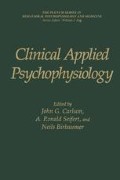Abstract
The development of applied physiology relevant to the stress researcher has been rapid during recent decades. This development means that it is now possible to record minute changes in the blood concentration of hormones, immunoglobulins, and lipoproteins, as well as the urinary and salivary excretion of several hormones. Furthermore, it is possible to follow physiological functions, such as electrical activity in the brain and the heart, as well as blood pressure measured at regular intervals in a fully automated way throughout day and night. One of the problems is that there are too many parameters that could be studied. Accordingly, it is important to give thought to the choice of parameters. In this chapter, I do not intend to present a comprehensive review of this field, but rather to give examples of the use of relevant markers and issues that have to be raised in the interpretation of results.
Access this chapter
Tax calculation will be finalised at checkout
Purchases are for personal use only
Preview
Unable to display preview. Download preview PDF.
References
Endresen, I. M. (1991). Psychoimmunological stress markers in working life. Doctoral thesis. University of Bergen, Norway.
Johnson, J. V, Stewart, W, Fredlund, P., Hall, E. M., & Theorell, T. (1990). Psychosocial job exposure matrix: An occupationally aggregated attribution system for work environment exposure characteristics. Stress Research Reports No. 221. Stockholm: National Institute for Psychosocial Factors and Health.
Jorgensen, R. S., & Houston, B. K. (1986). Family history of hypertension, personality patterns and cardiovascular reactivity to stress. Psychosomatic Medicine, 48, 102–117.
Perski, A., Olsson, G., Landou, C., de Faire, U., Theorell, T., & Hamsten, A. (1992). Minimum heart rate and coronary atherosclerosis: Independent relations to global severity and rate of progression of angiographic lesions in men with myocardial infarction at young age. American Heart Journal, 123, 609–613.
Theorell, T. (1990). Family history of hypertension—an individual trait interacting with spontaneously occurring job stressors. Scandinavian Journal of Work and Environmental Health, 16 (Suppl. 1), 74–79.
Theorell, T. (1992). Prolactin—a hormone that mirrors passiveness in crisis situations. Integrative Physiological and Behavioral Science, 27, 32–38.
Theorell, T., Perski, A., Ahmstadt, T., Sigala, E, Ahlberg-Hulten, G., Svensson, J., & Eneroth, P. (1988). Changes in job strain in relation to changes in physiological state. Scand. J. Work Env. Health., 14, 189–196.
Theorell, T., Orth-Gomér, K., & Eneroth, P. (1990a). Slow-reacting immunoglobulin in relation to social support and changes in job strain: A preliminary note. Psychosomatic Medicine, 52, 511–516.
Theorell, T., Karasek, R. A., & Eneroth, E (1990b). Job strain variations in relation to plasma testosterone, fluctuations in working men—a longitudinal study. J. Internal Med., 227, 31–36.
Theorell, T., de Faire, U., Johnson, J., Hall, E., Perski, A., & Stewart, W. (1991). Job strain and ambulatory blood pressure profiles. Scandinavian Journal of Work and Environmental Health, 17, 380–385.
Theorell, T., Leymann, H., Jodko, M., Konarski, K., Norbeck, H. E., & Eneroth, P. (1992). “Person under train” incidents: Medical consequences for subway drivers. Psychosomatic Medicine, 54, 480–488.
Undén, A.-L., Orth-Gomér, K., & Elofsson, S. (1991). Cardiovascular effects of social support in the work place: Twenty-four-hour ECG monitoring of men and women. Psychosomatic Medicine, 53, 50–60.
Author information
Authors and Affiliations
Editor information
Editors and Affiliations
Rights and permissions
Copyright information
© 1994 Springer Science+Business Media New York
About this chapter
Cite this chapter
Theorell, T. (1994). Notes on the Use of Biological Markers in the Study of Long-Term Stress. In: Carlson, J.G., Seifert, A.R., Birbaumer, N. (eds) Clinical Applied Psychophysiology. The Plenum Series in Behavioral Psychophysiology and Medicine. Springer, Boston, MA. https://doi.org/10.1007/978-1-4757-9703-9_15
Download citation
DOI: https://doi.org/10.1007/978-1-4757-9703-9_15
Publisher Name: Springer, Boston, MA
Print ISBN: 978-1-4757-9705-3
Online ISBN: 978-1-4757-9703-9
eBook Packages: Springer Book Archive

